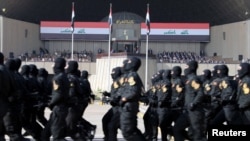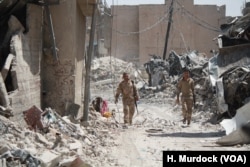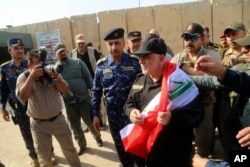Iraqi Prime Minister Haider al-Abadi has acknowledged Iraqi forces committed human rights violations in the battle to retake Mosul from Islamic State, but maintained the crimes were "individual acts" and the perpetrators would be punished.
Abadi spoke Tuesday after videos circulated on social media showing troops hurling captured IS suspects off a high wall in Mosul and then shooting their bodies.
Some of the most recent evidence surfaced after the prime minister declared victory last week, including a video showing a soldier shooting an unarmed man on his knees.
Abadi's acknowledgement came as Human Rights Watch said international observers found an execution site in west Mosul and it has other evidence showing Iraqi forces wantonly killed men as they fled the city at the end of the battle to retake Mosul.
The findings were included in a report that calls on the Iraqi government to investigate murder, torture and other war crimes by security forces and to hold them accountable.
The rights group said Wednesday Abadi has not investigated the wrongdoing as promised nor has any soldier been held accountable.
"He is ignoring the flood of evidence of his soldiers committing vicious war crimes in the very city he's promised to liberate," said Human Rights Middle East Director Sarah Leah Whitson.
"Abadi's victory will collapse unless he takes concrete steps to end the grotesque abuses by his own security forces," Whitson added.
The rights group also accused Iraqi forces of forcing the relocation of dozens of children and women with alleged ties to IS to a tent camp near the Old City that authorities describe as a "rehabilitation camp."
News coverage of developments in west Mosul has been limited since July 10 when the Iraqi military banned media access to the area.
Iraqi forces regained control of Mosul after IS dominated the city for three years.






